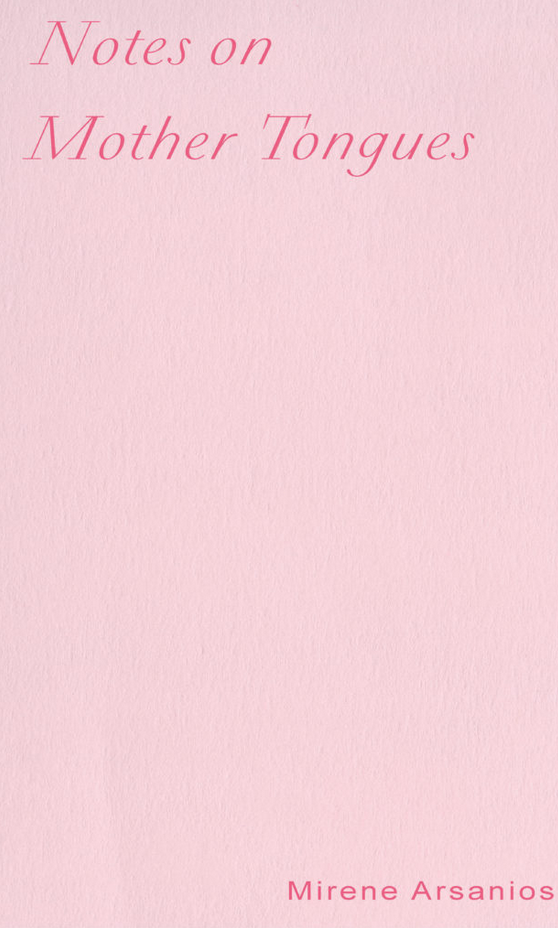
The chapbooks and books of poetry and prose included in this review are mostly from Ugly Duckling Presse. These works floored me in different ways, for different reasons.
Mirene Arsanios, Notes on Mother Tongues: Colonialism, class, and giving what you don’t have (Ugly Duckling Presse; 2020):
This brief meditation in short paragraphs on what it means to be interpellated—and not—within a network of languages echoes M. NourbeSe-Philip’s audio essay poem, “Discourse On The Logic of Language” and, even more specifically, NourbeSe-Philip’s book of poetry, She Tries Her Tongue—Her Silence Softly Breaks. Where NourBeSe-Philip writes to, and about, her daughter, Arsanios is, writing to, through, and for her son, as well as her Lebanese mother and Venezuelan father. Taking literally the concept of a mother tongue, Arsanios makes a character of this other mother whose “language” is a polyglot of languages: “Having many languages is my language’s dominant language. She learned Italian with her Eritrean boyfriend, French via the God of repressed Dominican nuns, Arabic in the streets of Beirut, Spanish with her Venezuelan grandmother.” With Fanon (Black Skin, White Masks) as her resource, Arsanios contemplates the complicated legacies of class, race, and privilege that her multilingual but untethered upbringing facilitates.
Jean D’Amérique, No Way in the Skin without This Bloody Embrace, tr. Conor Bracken (Ugly Duckling Presse; 2022):
One could easily read these searing lyrics, evoking both Negritude and figures like Alfred Jarry and Antonin Artaud, as consonant with the inimitable indictments in the poetry of Susana Thénon (see below). Indeed, the opening poems are almost too self-dramatizing in their unswerving self-regard (“I toss my phrases with abandon/ Into the splendor of ruins/ my inkwell/ a lurching boat extending them passage/ burning the periods/ so that sense is suspended/ so that their staggering ends well/”) before the perspective opens up to the larger political, cultural, and economic contexts of colonial and, of course, postcolonial life, a life that is itself a kind of death mask: “It was not you. It was not your face. A smile submachinegunned like hail rising from the skin. They weren’t your eyes. But a gaze grown out of the ruins.”
Jordan Davis, Noise (above/ground press; 2023):
Sure, there are the usual jokes (“Long Pauses Between Cakes”) and obligatory nods to surrealism (“The Moon Outshined by Cigars”) but there’s also, as there always was, among several Flarfists, a contemporary seriousness beneath the social satire (“The Coke Machine At The Time Share”), though this “relevancy” (e.g., “The Fort Washington Address”) should not be confused with the presentism which Davis upends in “Homage A Jean Pierre Leaud.”
Nada Gordon, The Swing of Things (Subpress Editions; 2022):
This serial poem, playing with generic poetic form, is a kind of extended or long-playing sestina. More importantly, it is, as one would expect, funny (“Taking the iamb/out of ambition”), witty (“It’s a given—like hush money/to pornstars”) and, of course, surreal (“In the old syrup/melted a time girl/over the things”).
Maria Paz Guerrero, God Is A Bitch Too, tr. Camilo Roldán (Ugly Duckling Presse; 2020):
As Roldan points out in his translator’s note, that “too” at the end of the title points to Guerrero’s real target, not god per se but patriarchal systems (and certain religions would be on her list) and their oppressive stereotyping of women, especially Latin American women. For Guerrero, given that the pleas and demands for dignity have fallen on deaf ears over centuries, the only recourse is to create a kind of allyship—“his period” (male menstrual cycle)—between god and women: “god is a bitch too/ and right now he’s a fat wrinkly bitch/ his period has been drying up intermittently// god goes dancing.” In this fast-paced prose-and-stanza–based poem, god “too” gets hit on by men, tries to go vegan to lose weight, and worries about his appearance, just “like” women.
Mike Lala, The Unreal City (Tupelo Press; 2023):
When this work was sent to me a few years ago, it was titled Work & Other Poems, which I actually prefer to its published Tupelo Press title. These excoriations of our present urbanity are fiercely and unrelentingly political, ecological, and personal: “I wake every morning, stand up, sit down,/ Do my work, bike to work, make someone money,/ in a trickle-up, eye-at-the-top-of-the-pyramid/ (left behind) scream called employment.” The last section of denunciations reminds me of Quentin Compton’s traumatic meditations on time in, appropriate to Lala’s work here, The Sound and the Fury—except Lala’s poems signify everything:
I open my fist. I sharpen my nose. I smell the coal-filth/ and rot and décor of our dear 19th century/ under the 20th. Tracks; their immediates: Forward/ (the deaths of the 20th century under the 21st)./ Forward. Light off the tracks (the crises of climate:/ Disease: migration: austerity: fascism). Forward/.
Abraham Smith, Insomniac Sentinel (Baobab Press; 2023):
The Joyce of Finnegan’s Wake meets the Whitman of “Song of Myself” in Smith’s latest collection of devastating celebrations of the natural world (here, sandhill cranes), of family (the last three or four poems are particularly poignant), and the indomitable human spirit, however (often) wrongheaded.
Susana Thénon, Ova Completa, tr. Rebekah Smith (Ugly Duckling Presse; 2020):
Argentine poet Susana Thénon published some of the most impassioned poetry from the mid to the late twentieth century. Ova Completa can be read as a summary of most of the political, cultural, religious, and social pieties she attacked with sarcastic gusto and humor, often showing their entanglement: “hold on tight/ This is culture/ which means:/that some turned the fields and out came plants/ and others turned their encephalons and out came/ the brothers Karamazov.” As Maria Negroni notes in her afterword, Ova Completa rejoices in the carnivalesque absurdities of languages, especially Spanish and English.
Tyrone Williams teaches at SUNY Buffalo and is the author most recently of stilettoes in a rifle range (Wayne State University Press, 2022).
This post may contain affiliate links.







